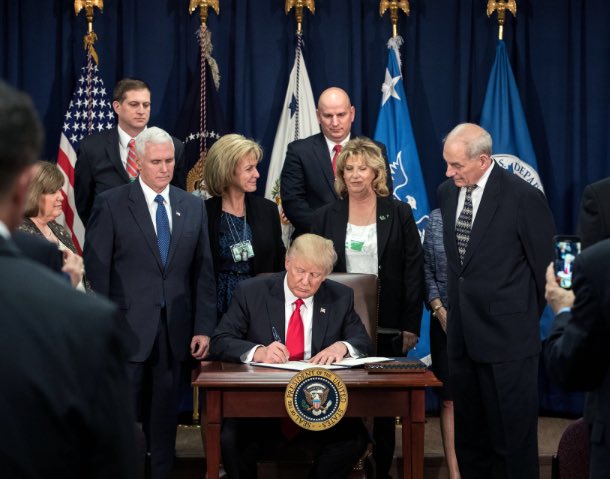Trump’s executive order to ban citizens of seven Muslim-majority countries from the U.S., comes in flagrant defiance of all international humanitarian laws and basic human rights. This ban is not about protecting Americans from ISIS or “Islamic extremists”. Instead, Trump’s policy is the first step in an economic and political strategy designed to rebuild the American Empire.
Trump’s pledge to “Put America First” intends to re-establish U.S. imperial dominance and check the growing power and role of Iran in the Middle East. We might note here that not a single country in Trump’s “list,” with the exception of Iran, has escaped direct U.S. military assault. None has been saved wrath and devastation inflicted by the U.S. and none has not lost tens of thousands of women, men and children, killed by American planes or other weapons. All U.S. presidents, including Obama, have taken part in these wars. Now it is Trump’s turn.
Of these countries, it is the three largely independent nations of Iran, Syria and Iraq that are of particular importance to Trump’s vision of the U.S. empire.
Why Iran?
Considering Iran is the only country that does not have organized terror, why is Trump targeting this country? Iran, especially after the Five Plus One deal in 2015, has witnessed a considerable growth in its economic self-sufficiency, military growth, nuclear capabilities, and political influence in the Middle East — threatening U.S. regional ambitions in the process. The Obama Administration’s deal was meant to “open up” Iran — in the same way U.S. interests are “opening up” Cuba. This did not happen. Instead, the deal angered both hawkish Republicans and Trump’s strongest friend, Israel. Israel has always considered Iran its arch enemy, because of its independent economic and political will and its role in lending strength to other Arab countries.
Why Syria?
It has become clear that the U.S. was never serious about fighting ISIS or al-Qaeda terrorists in Syria. If anything, as Trump himself admitted, the U.S. helped “invent” ISIS. For years, the U.S. has failed to separate al-Qaeda — also its invention — from the so-called “moderate” terrorists in Syria to prevent Syrians and their Russian allies from targeting them. As a result of the wars on Syria (and Iraq), millions of Syrians (and Iraqis) were rendered refugees, seeking shelter all over the world. Yet, Syrian refugees are not immigrating to the U.S. in the millions. In fact, Canada with a population of less than 11 per cent of the U.S. has accepted over 30,000 Syrian refugees, while the U.S. has hardly admitted 10,000.
Trump realizes the importance of Syria’s potential economic power stems from its huge reserve of natural gas. This economic power can also increase Syria’s political power and independence — upsetting, in the process, Israel’s and the U.S.’s designs for a submissive Middle East. It is significant to mention here, that, not unlike Iran, Syria, for the last three decades or so, has also been under economic boycott by the West, yet it managed to survive it without being dependent on any of the U.S.-controlled conglomerates, like the World Bank or the IMF.
Syria also refused to allow Qatar to run a Western-backed oil pipeline through Syria to the West. Instead, Syria chose to prefer a similar deal with Russia. In other words, Syria has become too strong and independent for the West.
As a candidate, Trump promised to get rid of ISIS in Syria with the help of the Russians. When he became president, Trump changed his mind and announced he would impose the so-called security zone on Syrian territories.
This type of intervention in other countries is illegal; neither Israel nor Turkey, though they suggested similar policies earlier, could enforce it.
Why Iraq?
Iraq has suffered untold destruction and suffering during the U.S. war. One of President Obama’s very first pledges was to withdraw all U.S. forces from Iraq. While some of the forces were withdrawn, U.S. military bases remain in Iraq to this day. Iraq is still largely dependent on the U.S. for major decisions on how and when it can fight ISIS.
In fact, I find it difficult to explain Iraq;s inclusion in this list. The American embassy in Iraq is one of the largest, if not the largest in the area. Thousands of American officials work in the country, and here are more Americans in Iraq than Iraqis in the U.S.
The missing link here is the Shi’a Muslim majority, whom the U.S. prevents from joining their own (Iraqi) army. No wonder they asked Iran for help in defending their homes, villages, towns and territories from ISIS. Iraq is seen by the U.S. as a defiant force not in total submission to its whims. Finally, Iraq, despite its devastation remains a strong and rich oil-producing country, a source useful for Trump’s vision of the Empire.
Trump’s foreign policy is not very different from all previous administrations, Republican or Democrat. The American s drive to build, reproduce and expand its imperial role never changes. The only changes we are witnessing with Trump is his open racism, lack of diplomatic language and open Islamophobia.
Nahla Abdo is an Arab-Canadian feminist, political activist and Professor of Sociology at Carleton University. Among her publications: Captive Revolution; Women in Israel: Race, Gender, and Citizenship; and Women and the Politics of Military Confrontation.
Please chip in to keep stories like these coming.
Image: Twitter/@RealDonaldTrump



